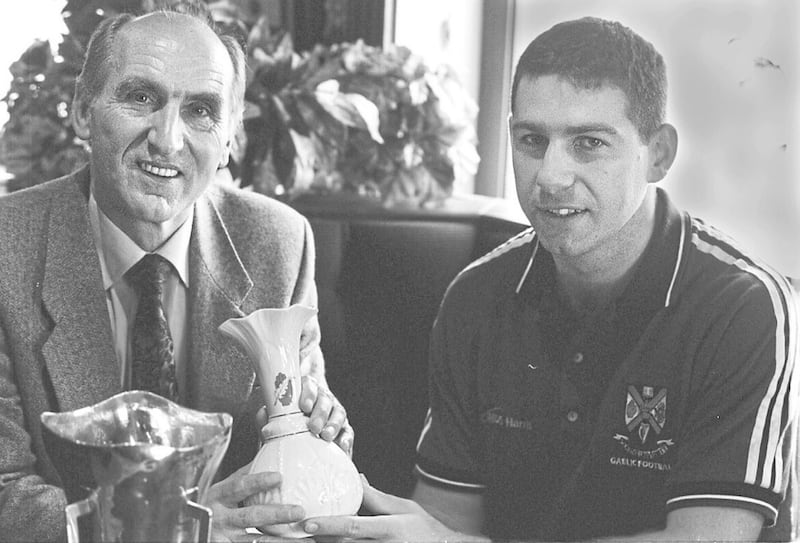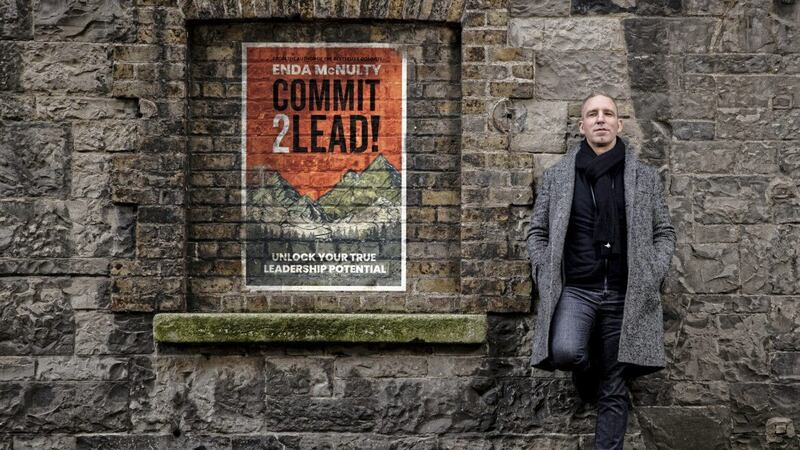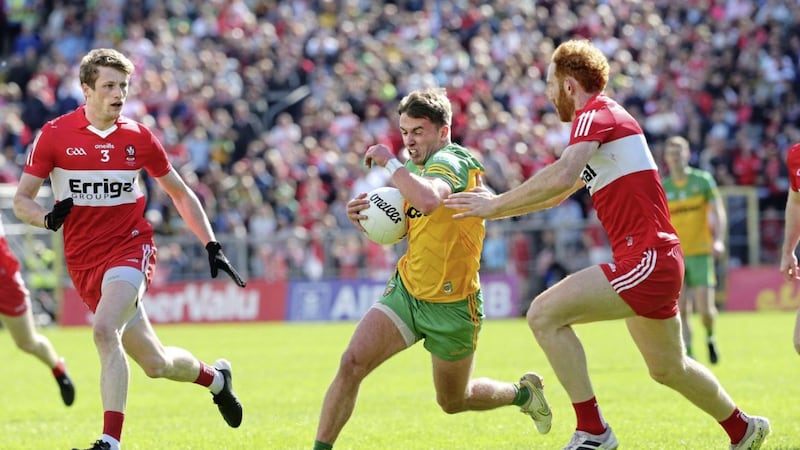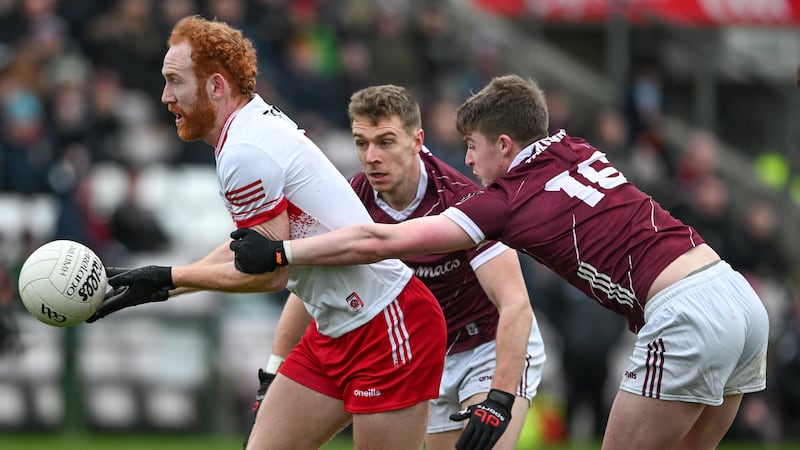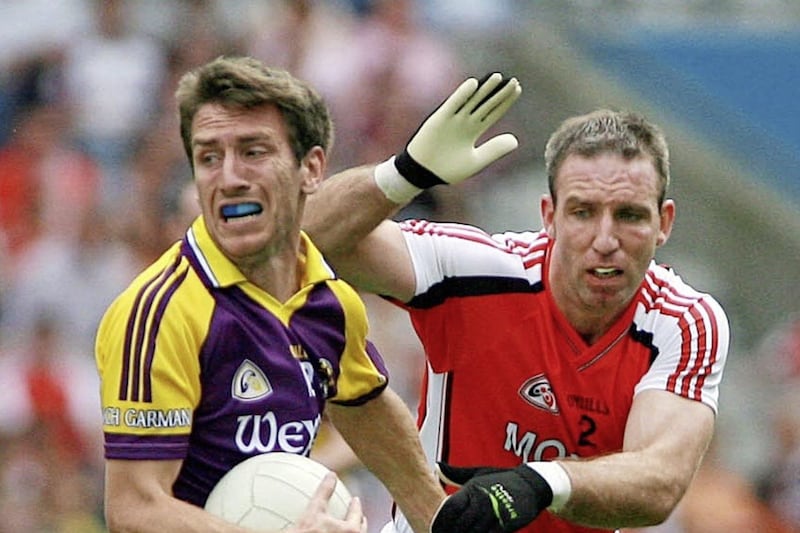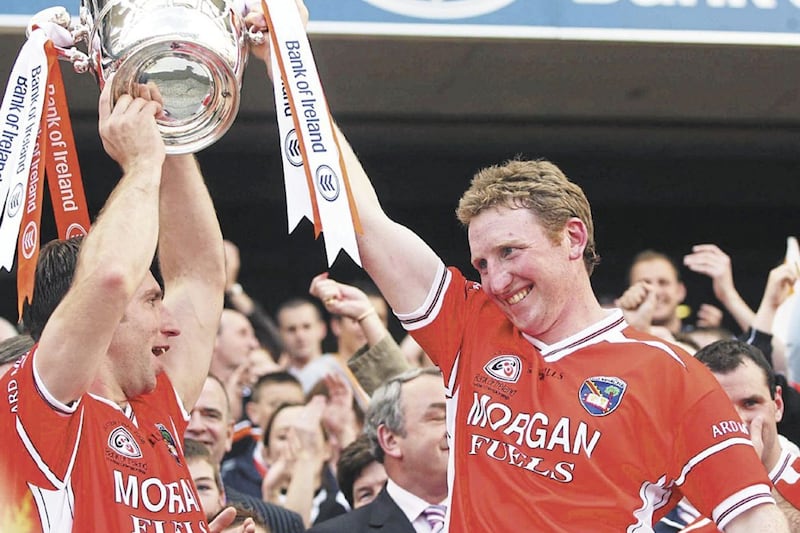ENDA McNulty reckons it was around 2000, maybe a few weeks out from Armagh’s All-Ireland semi-final joust with Kerry.
Dessie Ryan had invited him to his daughter’s wedding at the Canal Court Hotel in Newry.
The reception was in full swing and the dancefloor bursting at the seams. McNulty was parked at the end of the bar. Sipping water.
Nights like these ended up being endured rather than enjoyed. Kerry were just too close for comfort to consider sipping anything other than water.
The Gooch. Dara O Cinnéide. Mike Frank Russell. Maurice Fitzgerald.
The great Eamonn Coleman wandered over to the bar. Enda spotted him. The pair struck up a conversation, but Enda wanted a bit more than the usual chit-chat.
‘So, Eamonn, how should I mark Mike Frank Russell? What about O Cinnéide? What do you think of O Cinnéide?’
Sitting on the top floor of the Devlin Boutique Hotel on Ranelagh Road, Dublin, Enda McNulty smiles at his younger self.
“I’m asking Eamonn Coleman for coaching advice. I’m frantically trying to download his experiences out of his head because he’d won the All-Ireland and was hugely respected, an iconic influence on Ulster football.
“I had this insatiable desire to grow and learn. There were all these beautiful young girls around the bar, and here’s me at the corner of the bar with Eamonn Coleman…
“I always remember his eyes were dazzling blue and I’ll never forget what he said for as long as I live.
‘Enjoy it, Enda,’ grinned Coleman.
‘Yeah, I hear you Eamonn, but what about the second half? If I’m marking Cooper, what would you advise?’
‘Enjoy it, Enda.’
‘I know, but tactically, Eamonn, what do you think we could do? What are we going to do with Maurice Fitzgerald?’
‘Enjoy it, Enda,’ came Coleman’s jocular refrain.
“I left none the wiser. It took me 15 years to figure out what he was saying.”
To this day, it’s a simple parable Enda McNulty tries to live his life by.
“If I had a time machine, I would go back and enjoy it more,” he says.
He definitely enjoyed his Queen’s days – even the near-misses in Sigerson competition, “crying like a baby in the Bot” after the Guards beat them in the semi-finals at The Dub in ’99 only for Dessie Ryan to lead them to the Holy Grail the following year, edging out UCD in a dramatic extra-time decider in Galway.
McNulty always pleaded with sports psychologist John Kramer to prep the Armagh team a couple of days before their Ulster finals and Kramer would refuse. ‘Enda, relax. You’re ready now.’
“I’m married to Julia four or five years. We are expecting our first child this August,” he beams.
“Julia would say to me that I was far too focused, relentlessly focused. If I have a regret, it’s not being more rounded during my playing days.
“I burnt a lot of relationships when I was younger and I’m not just talking about girlfriend relationships, I’m talking about friends. I met an old buddy at an Abbey Past Pupils function and I was making a speech at it. And one of the guys said to me: ‘What happened between me and you, Enda? Back in the day we used to go out for pints all the time. What the hell happened?’
“Sure I stopped going on the drink and became a professional athlete. So that guy who I had a couple of bottles of beer with, he felt I’d disowned him. But I became devoted, too devoted [to my sport].
“Another regret is, I tried too hard for a lot of my career. I reached a high level in some major games for Queen’s and Armagh but I didn’t get there often enough. I achieved about 40 percent of my potential as a footballer. That still hurts me, but it drives me."
~~~~~~~~~
THE McNULTY and Crilly gene pools were full of entrepreneurial spirit. Both clans were resourcefulness itself. All you needed was an idea.
One of his uncles was a farmer, another manufactured sweets, known as Crilly’s Sweets, established in 1974 - an idea which is now global.
In his young teenage years, Enda would be out selling his uncle’s confectionery down in Newcastle or Bushmills in summer time.
To earn more money, Enda’s mother, Mary, would sell Dunne’s Stores merchandise door to door around their home place of Mullaghbawn.
His father, Joe McNulty, was a teacher at St Paul’s, Bessbrook. Joe was a man of considerable standing in the community.
Towards the end of the 1980s and with the ‘Troubles’ still raging, Enda’s father was approached by SDLP leaders John Hume and Seamus Mallon to head up an International Fund for Ireland, which was designed to bring money and jobs into the north, to foster cross-border relations and to ignite a rural regeneration of south Armagh.
“So Dad got that role and they sent him on a 10-day course to broaden his horizons. It was called Investment in Excellence and the course was basically about Positive Psychology back in the day – self-esteem, self-worth, self-belief, self-confidence – and the course had a profoundly positive impact on my Dad.”
Lou Tice changed everything. Born in Seattle in 1935, Tice was a world renowned motivational speaker. Enda’s father was fascinated by him.
“Dad started playing these Lou Tice tapes in his Renault 18 with a radio that was stuck into the dashboard with a piece of timber and I can still remember the content: ‘How do you develop your self-confidence, your self-worth, your self-confidence?’
“I can still hear Tice’s words: ‘Remember yourself comes like a muscle [pointing to his head]. You must work on that muscle all day, every day.’
Any chance he got, Joe McNulty would spread the gospel, according to Lou Tice.
On occasion he would pick Enda up from training at the Abbey and offer the McEntee twins, Aidan O’Rourke or Barry Duffy a lift to the bus and he’d play the tapes.
Later, the boys would say to Enda: ‘What is your Da listening to?’
“And he’d even say to Val Kane, an unbelievable coach we had at the Abbey: ‘Val, listen to this piece. What do you think of this?’ And Val would say: ‘Joe, I have to go.’
“Initially, I was unbelievably resistant. I was meeting a global CEO yesterday and he was resistant to the first meeting, but I’m okay with that because I was resistant 25-30 years ago. Resistance is okay.”
Those Lou Tice tapes stayed with McNulty and, for him, were the first inklings of interest in psychology.
~~~~~~~
A PSYCHOLOGY student at Queen's, Enda McNulty entered the realm of high performance coaching long before he stopped playing with Armagh.
Now 46, he is CEO of McNulty Performance – a company that specialises in coaching at a sporting, corporate, individual and global level.
McNulty’s company has worked with Google, Amazon, Microsoft and Facebook and he is the author of two books.
A Sigerson Cup winner with Queen’s in 2000, a serial Ulster medallist and 2002 All-Ireland winner with Armagh.
At 32 and still involved with Armagh, Michael Cheika, the former Leinster rugby coach, took a chance and appointed the Mullaghbawn man as the team’s high performance coach.
McNulty hasn’t looked back since and was a vital cog in various managerial set-ups that saw Leinster win three Heineken Cups and Ireland three Six Nations.
While trying to prove himself every day with the likes of Cheika, Brian O'Driscoll and Gordon D'Arcy, McNulty's Armagh career was stuttering to an unsatisfactory conclusion.
First choice for the vast majority of it, the teak-tough corner-back found it exceptionally difficult coping with his new-found status as a squad player.
“I’d hope if you asked Dessie Ryan or Brian McAlinden or Joe Kernan, they’d say: ‘Enda worked relentlessly hard among a group of brilliant leaders for the largest part of his career.’
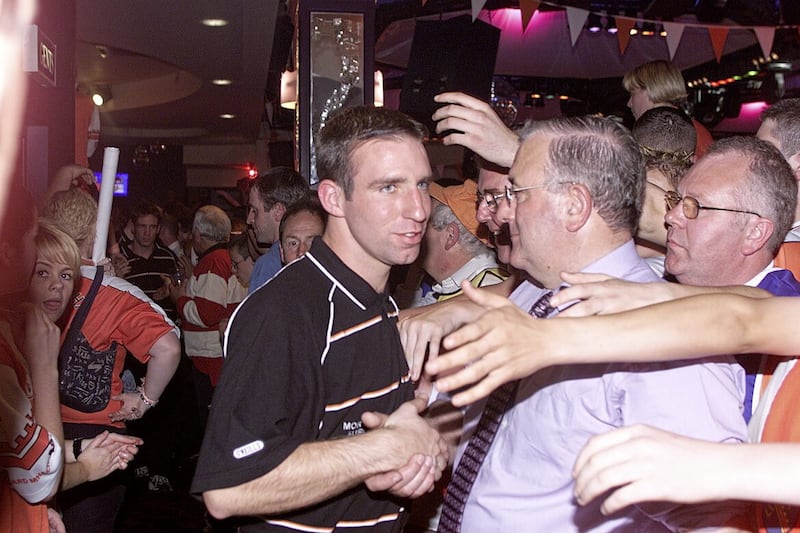
“Towards the end of my career, when I wasn’t playing, I found it really difficult. I didn’t play much in my last two or three years with Armagh. Was I the happiest, go-luckiest fella at that time? I was livid. I wasn’t exactly high-fiving everybody. It was hard when you weren’t even picked to go on the bus.
“I was still trying to train 10 times a week: gym work, Pilates, yoga, sprint work, skills work, but was I a joy to manage in the last couple of years? I wasn’t.”
He adds: “I finished in 2011, so for the last three years I barely had any game-time. I don't think I got any game-time. Peter McDonnell and Paddy O’Rourke were managers during that time.
"Two great fellas, a huge amount of respect for both of them. But the reality was I was at the end of my playing career. Could I have left three or four years earlier?
“I remember Tony McEntee had retired and I was warming up along the sideline in Crossmaglen. I always kept warming up and I could hear this voice behind me: ‘What are you at, Enda? What are you at?’ (laughing)
“I knew it was Tony McEntee’s voice. I didn’t need to turn around. I did another two years after Tony Mc said: ‘What are you at?’ I should have listened!
“But in a lot of ways, I used it as fuel for the fire because it made me unbelievably humble. It was part of my character formation because I was going back the next day to work with Leinster rugby. And I knew what the hurt was like of not being picked.
"Johnny Sexton came to me and said: ‘Enda, I’m not in the Heineken Cup squad for the weekend.’ That meant he was the third-choice 10 in Leinster. That was about the same time Armagh were leaving me out of the squad. And I was working with a young Johnny Sexton who is now one of the best players in the world. So I used that hurt for my growth and development.”
~~~~~
AS one career was ending, another was taking off, the trajectory of which exceeded his own lofty expectations.
Working with the likes of Joe Schmidt at both Leinster and Ireland was arguably the most intellectually challenging and rewarding of McNulty’s fledgling career in sports science and psychology.
Schmidt dealt in the hard currency of physical evidence. Show me, Enda. Show me what you mean.
“If I made a comment to Joe: ‘Joe, we need to improve the mental toughness of the squad.’
Joe would say: ‘Hold on a second. What does that mean? Define mental toughness.’
“And, thank God, I knew [clicking his fingers] because of my work with John Kramer. And Joe would say: ‘Okay, you’ve given me an understanding of what it means. Now, how would you develop it over the next 24 months? Talk me through it. Not only tell me – show me.’
McNulty would open his lap-top – and show him. And McNulty could breathe out.
But the way he rationalised the challenges set by Schmidt was simple: if he could survive tackling drills with “Justin McNulty or Diarmaid Marsden or ‘Bumpy’ O’Hagan and you’re one-on-one with that player getting battered or you’re taking Kieran McGeeney or John McEntee or John Toal’s elbows, Joe was much easier.
“But Joe was relentless – and I mean relentless – on the basics of the game. Every day. Every session. Every meeting. In the warm-up for the All Blacks, Joe was hammering the basics: ‘Don’t drop that f***ing ball.’”
Schmidt didn’t do praise either. Empowerment was enough for McNulty.
“You weren’t wanting or needing praise – you were being backed.”
~~~~~
ENDA McNulty has been inhabiting deep waters for most of his life. Since dipping his toe into the ruthless environs of high performance almost two decades ago, he’s still in deep waters, still in his “discomfort zone”.
For him, it’s the only way to live.
“We’re currently speaking to a Formula One team about helping their high performance team.
“I remember someone once said: If somebody called you up today, and told you there’s a jungle ahead, you can choose the bikes and you can cycle around the jungle and have a look in.
“Or, you can get into a 4x4 old-school jeep, put a guy in the driver’s seat and he’ll show you how to get across it.
“The third option is, here’s a machete, here’s a few boys, go with them, you’re given no navigation and you’ve a week to get across the jungle.
“Option number four is: don’t even think of going into that jungle, sit in this lovely hotel room looking out at the jungle.
“No doubt about it, I would want the machete and a few boys. There’d probably be a Diarmaid Marsden and a Justin McNulty, I’d definitely want Dessie Ryan there.
“I’d definitely want Kieran McGeeney and Paul McGrane with me… That’s my personality. And that has caused issues with my relationships, even in business.
“My board said to me: ‘Enda, we can’t do 32 countries’. I said: ‘Who says we can’t?’ We’ve now done it. We’ve worked across 32 countries for an organisation where we had to travel all around the bloody world and we did. But that was the jungle. In some cases, we had no machetes.”
Throughout his life, he’s taken bits and pieces from different managers and coaches, team-mates, friends and work colleagues alike.
Joe Kernan. Paul Grimley. John McCloskey. The two Brians. A fair amount from John Kramer. Val Kane. His guiding lights, Joe and Mary McNulty. The Crillys.
His neighbours in Mullaghbawn. Paul McGrane. Geezer. Marsden. Paddy McKeever. Those Lou Tice tapes in the old Renault 18 echo still.
Professor Ian Roberston. Joe Schmidt. Michael Cheika. Brian O’Driscoll. Tony McEntee from behind the wire. The simplicity of Eamonn Coleman. And those amazing neuroscientists at Trinity College that “bruised his brain” the day before this interview.
But nobody made a bigger impact on Enda McNulty’s life than the inimitable Dessie Ryan.
Over lunch, his good friend, Enda Muldoon once asked McNulty what exactly it was that he did for a living," he replied: “We coach leaders, we train leaders, we advise leaders, we work with teams, we transform them into high performance teams, we build that winning IQ, we build mental toughness - just like John Kramer taught us.
“We started off in amateur sport, then we moved to professional sport and now we work with organisations around the world – and we do it the way Dessie Ryan did it. In essence, what we do around the world is what Dessie Ryan did for us at Queen’s. What we had at Queen's was almost mythical.
“Dessie was without doubt the best pound-for-pound coach I ever had and that's including all the international managers. He made a profound impact on my life.”
What does he miss about his playing days? It’s probably the easiest question of all. Everything, he says.
“I miss every single night we trained together. I miss picking Steven McDonnell up and knowing that we were going toe to toe for 90 minutes...
“I miss that unbelievable feeling coming home on the bus after beating Kerry or Dublin or Donegal. I miss the nerves of going into Croke Park, the old coliseum, and Tony McEntee sitting like Cool Hand Luke and looking out the window saying: ‘Look, there’s Johnny and there's Mickey…’ And I'm too nervous to look out the bloody window.
“Benny Tierney telling jokes on my right-hand side, Paul McGrane passing the fruit pastilles around, never failed – ‘Here you go boys. Enda, you like the black ones.’
“I miss marking Peter Canavan and knowing if I’m not on it for every split second, he’ll turn me inside out.
“But everything probably goes back to Eamonn Coleman… If he was sitting here now, he would say: ‘Enjoy it fellas. Enjoy it.’ I’m still trying to work at that.”
Enda’s second book ‘Commit 2 Lead!’ is available in all good bookshops, websites and direct from www.mcnultyperformance.com All proceeds of the first month’s sales will go to humanitarian charity GOAL
